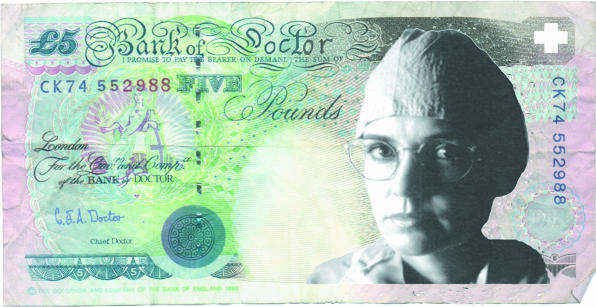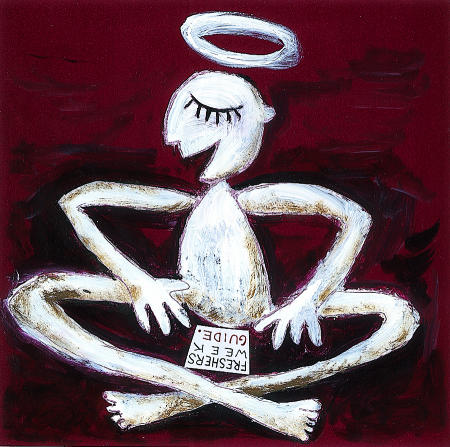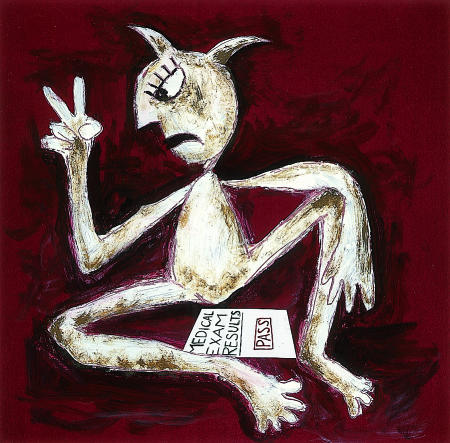Abstract
Objectives
To examine whether medical students made fewer altruistic wishes and more money oriented wishes in later years of the medical course than students in earlier years.
Design
Anonymous questionnaire survey.
Setting
Auckland University School of Medicine.
Participants
520 medical students from 6 years of the course responded to the questionnaire item “If you had three wishes what would you wish for?”
Main outcome measures
Proportion of wishes in various categories.
Results
The three most popular categories of wishes were happiness (34% of students), money (32%), and altruistic wishes (31%). Rates of altruistic wishes (odds ratio=1.05, 95% confidence interval 0.94 to 1.18; P=0.36) and wishes for money (odds ratio=0.96, 0.86 to 1.08; P=0.52) did not vary over the years of the course. Female medical students were more likely than males to make altruistic wishes (36% v 26%; χ2=5.68, P=0.02), intimacy wishes (25% v 18%; χ2=3.74, P=0.05), and happiness wishes (42% v 26%; χ2=18.82, P=0.0001). Men were more likely than women to make sexual wishes (5% v 0.8%; χ2=7.34, P=0.01).
Conclusions
We found no evidence that students were less altruistic and more money oriented in the later years of the medical course.
Introduction
Medical education is often criticised for having a detrimental influence on the values of students. Medical courses have been accused of taking in idealistic and caring students and producing cynical and less than altruistic graduates. Some studies have found that medical students report they become more uncaring, cynical, and concerned about making money over the course of their training.1,2
Assessment of such changes, if they exist, is problematical. Retrospective, subjective ratings of changes in attitude over the medical course are difficult to interpret because it is hard to know how such ratings may be influenced by expectations and reporting bias. Another approach is to examine whether personal goals and wishes differ over the medical course. Wishes can be defined as goals that are unconstrained by the limitations of the real world and can be used to reveal values such as helping others and the desire to make lots of money.3 By asking students what they would wish for if they were given three wishes, we examined how the proportions of different types of wishes vary across the course and between male and female medical students.
Participants and methods
Five hundred and twenty Auckland University medical students from the six years of the undergraduate medical course participated in the research, representing 81% of the school's medical students. The sample comprised 258 men (49.6%) and 262 women; the number of students in years 1-6 were 79, 87, 90, 93, 99 and 74, respectively. Most students were from a European ethnic background (333, 64%), with the remainder comprising Asian (104, 20%), Maori (26, 5%), Pacific Islanders (15, 3%), and other races (42, 8%). During medical school lectures students were asked to complete an anonymous questionnaire which included the following question: “If you had three wishes, what would you wish for?” Wishes were coded by two judges using an established coding scheme.4 Interrater reliability was calculated by using the wishes from a subset of 90 students (17% of the sample), and agreement between the two judges was high (Cohen's κ=0.89).
A BLANCO
Results
The table shows the numbers of students with wishes in the various categories. Some wishes were coded into more than one category—for example, “a great deal of wealth so I can use it to help and enrich the lives of people I love.” The three most popular categories were happiness (34%), money (32%), and altruistic wishes (31%). Logistic regression analysis revealed that, contrary to predictions, the rates of altruistic wishes did not vary over the years in the course (B=0.05 (SE 0.06); Wald's χ2=0.84, P=0.36; odds ratio=1.05, 95% confidence interval 0.94 to 1.18). There was also no evidence that the frequencies of wishes for money increased over the years of the course (−0.04 (0.06); χ2=0.42, P=0.52; odds ratio=0.96, 0.86 to 1.08). Wishes that related to improving self esteem were more common in the earlier years (−0.17 (0.07); χ2=5.30, P=0.02; odds ratio=0.84, 0.72 to 0.97); the numbers of students expressing esteem wishes were 16 (22%), 16 (18%), 20 (22%), 9 (10%), 5 (5%), and 13 (18%) for years 1 to 6 respectively. Similarly, affiliation wishes were more prevalent among students in the earlier years of the course (−0.24 (0.12); χ2=3.98, P=0.04; odds ratio=0.79, 0.63 to 0.99); the numbers of students with affiliation wishes were 5 (6%), 9 (10%), 7 (8%), 5 (5%), 0, and 3 (4%) for years 1 to 6 respectively. There was also a trend for wishes for greater knowledge to be reported more commonly by students in the earlier years of the course (−0.21 (0.11); χ2=3.48, P=0.06; odds ratio=0.81, 0.65 to 1.00).
BEN DICKSON
Several students wished for vocationally useful powers including “x ray vision,” “the power to visit the dead,” and the power “to travel through time.” Others wished for more generally useful abilities such as “the ability to breathe underwater,” “to fly like a bird,” and “to change sex at will.” Several innovative combinations of wishes were given, including “a photographic memory, money, and liposuction”; “omnipotence, bodily perfection, and a harem”; and “astral travel, world anarchist revolution, and good skin.”
BEN DICKSON
Several differences existed in the proportion of wishes listed by men and women. Women were more likely than men to make altruistic wishes (94 (36%) v 67 (26%); χ2=5.68, df=1, P=0.02), intimacy wishes (65 (25%) v 46 (18%); χ2=3.74, df=1, P=0.05), and happiness wishes (110 (42%) v 67 (26%); χ2=18.82, df=1, P=0.0001). Men were more likely than women to make sexual wishes (13 (5%) v 2 (0.8%); χ2=7.34, df=1, P=0.01).
Discussion
We found no evidence that students in the later years of the medical course were less altruistic and more money oriented in their wishes than their more junior colleagues. Altruistic and money wishes were as common in later years of the course as they were in earlier years. The overall rate of altruistic wishes is high in this student group and much greater than that reported in American university students (8%).4 The higher levels of self esteem, knowledge, and affiliation wishes in the earlier years of the course probably reflect the new demands of the course in these early years. These findings do not fit with the popular view of medical school education turning students into cynical and uncompassionate graduates. The results are, however, consistent with a previous longitudinal study of medical attitudes which showed that measures of empathy and a non-cynical, person oriented approach to patient care remained stable over a three year follow up at medical school.5
What is already known on this topic
Some studies have shown that medical students become more uncaring, cynical, and concerned about making money during the course of their training
Assessment of such changes is difficult because of expectations and the retrospective nature of such surveys
What this paper adds
Asking individuals about personal wishes can be used to assess underlying motivation
There is no evidence that students became less altruistic and more money oriented over their medical course
The overall rate of altruistic wishes was high (31%)
Strong sex differences exist, with women making more altruistic, intimacy, and happiness wishes than men
The differences in the wishes of men and women have been the focus of considerable debate in both the scientific literature and everyday social settings. We found that female medical students made a greater number of altruistic, intimacy, and happiness wishes than males. By contrast, male students had a higher rate of sexual wishes. These results are surprisingly consistent with those predicted from evolutionary psychology, which has shown the sexes to differ in the domains where they have faced different evolutionary adaptive challenges.6
The close grouping of the top four wishes highlights the difficulties many doctors have later in their career of finding a balance between professional and personal goals. However, the high and stable rate of altruism evident in the wishes of medical students throughout their course suggests that this characteristic may be less degraded by the training and economic pressures than many people have thought.
Table.
Rank order of wishes according to the number of students expressing each wish
| Rank | Wish | Examples | No (%) of students (n=520) |
|---|---|---|---|
| 1 | Happiness | To be happy throughout my life. Happiness in my career and personal life | 177 (34) |
| 2 | Money | One million dollars. My student loan to go away | 165 (32) |
| 3 | Altruism | To help others in need. An end to world hunger and poverty | 159 (31) |
| 4 | Achievement | To become a successful surgeon. To get into a top specialist training position | 141 (27) |
| 5 | Health | Good health for myself and family. Avoid the health problems of my parents | 116 (22) |
| 6 | Intimacy | True love. To have good relationships with those I care about | 110 (21) |
| 7 | Self esteem | To be more confident in the things I do. To have the guts to go for what I really want | 79 (15) |
| 8 | Religious | That I would honour God in all that I did. That all my friends become Christians | 41 (8) |
| 9 | Travel | Travel the world. Go to Europe on a ski holiday | 41 (8) |
| 10 | Time | To have enough time to do what I want to do. Two more hours each day | 40 (8) |
| 11 | Knowledge | To never sit exams again and still know everything about medicine. To have already finished medical school with all the knowledge I need | 33 (6) |
| 12 | Appearance | To have the ultimate body. Never go fat | 32 (6) |
| 13 | Affiliation | To have a larger and supportive group of friends and acquaintances. To see my friends and family more often | 30 (6) |
| 14 | Power | To be president of the world. World dominance | 24 (5) |
| 15 | Food | To have a Big Mac right now. A lifetime supply of chocolate | 16 (3) |
| 16 | Sexual | A gorgeous babe. A constantly available supply of high quality sex | 14 (3) |
| 17 | Undoing | To see my grandparents, who have died. I wish I had followed a different path | 11 (2) |
Footnotes
Funding: None.
Competing interests: None declared.
References
- 1.Kay J. Traumatic deidealization and the future of medicine. JAMA. 1990;263:572–573. [PubMed] [Google Scholar]
- 2.Wolf TM. A retrospective study of attitude change during medical education. Med Educ. 1989;23:19–23. doi: 10.1111/j.1365-2923.1989.tb00807.x. [DOI] [PubMed] [Google Scholar]
- 3.King LA. Wishes, motives, goals, and personal strivings: relations of measures of human motivation. J Person. 1995;63:985–1007. doi: 10.1111/j.1467-6494.1995.tb00323.x. [DOI] [PubMed] [Google Scholar]
- 4.King L, Broyles SJ. Wishes, gender, personality and well-being. J Person. 1997;65:49–76. doi: 10.1111/j.1467-6494.1997.tb00529.x. [DOI] [PubMed] [Google Scholar]
- 5.Zeldow PB, Daugherty SR. The stability and attitudinal correlates of warmth and caring in medical students. Med Educ. 1987;21:353–357. doi: 10.1111/j.1365-2923.1987.tb00375.x. [DOI] [PubMed] [Google Scholar]
- 6.Buss DM. Psychological sex differences: origins through sexual selection. Am Psychol. 1995;50:164–168. doi: 10.1037/0003-066x.50.3.164. [DOI] [PubMed] [Google Scholar]





